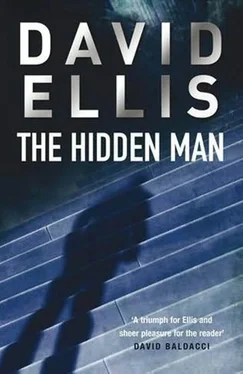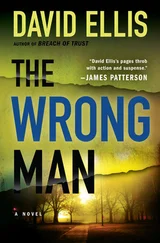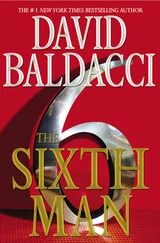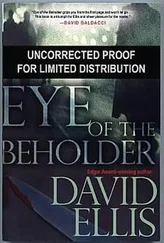The next hours, the late afternoon and early evening, are agonizing. You walk aimlessly, slowly circling back toward your neighborhood. You’re hesitant to make it home that night, wondering if a police car is awaiting you on the driveway. You approach your house tentatively, scanning up and down the street. When you walk through the front door, your sweat-drenched hair stuck to your forehead, your pulse rattling, your mother is sitting at the kitchen table with your brother, Pete.
Sammy’s at the police station , she tells you.
I DROVE BACK from the police station, thinking about Sammy in his cell, thinking about Mrs. Perlini and the denial she lived with, and thinking about the blue Chevy that had kept a pretty safe distance from me since I first drove back to my old neighborhood earlier today. I could only assume that this was the same friend I’d made a couple nights back, leaving that club. I was being followed, no question.
I called Pete on my cell. He wanted to head out tonight and I said I’d think about it. He sounded okay on the phone, but I was still thinking about the other night at the club. I was pretty sure he’d been using drugs, and for all I knew, he’d been back using for quite some time. I’d been in such a funk for the last four months that it had probably escaped my attention.
“We gotta talk, little brother,” I told him.
He laughed. “‘We gotta talk?’ What does that mean?” He was being defensive. From what I knew, Pete had never been more than a casual user, but the slope, as they say, was a slippery one.
I didn’t respond to him because he knew what I meant. I didn’t have any right to tell him what to do, and I had no real desire to do so. Add to that, Pete had done a pretty good job watching over me these last few months, so it felt a little weird preaching to him. Still, I couldn’t just let it go.
“Just-we’ll talk tonight,” I said, after tiring of his moaning.
“Forget about tonight,” he said. “Save your sermon for someone else. And hey-it’s nice to see you’re back to form, telling me how to live my life.”
I drove home with the music down, keeping an eye on the Chevy following me, memorizing the license plate, though I assumed that a trace wouldn’t get me anything. I thought about screwing with the guy, hitting the brakes, maybe letting him pass me, waving hello to him or tailing him, but I didn’t see any advantage in any of that. Better he should think he’s a world-class expert in surveillance, until I could figure out what I needed to do with him.
ISPENT THE NIGHT IN, staring at the walls of my bedroom, watching the television with the sound low. I was beyond the point of self-torture. I no longer played the CDs that Talia loved, Morrissey and Sarah McLachlan and Tracy Chapman. I no longer obsessed over our wedding album. I no longer so much as set foot in Emily’s room, the nursery, which Talia had done out in pink and green with a Beatrix Potter theme, cute little bunnies prancing among soft pastel colors.
Nor did I drink, at least not for the purpose of drowning my sorrows. Alcohol didn’t work for me that way; it heightened the pain, unleashed emotion. When you’re drowning, you already feel out of control. You don’t need intoxication to feel unstable.
No, the only thing for me was frivolous diversion, the most innocuous sitcom or infomercial I could find on the tube, the easiest beach-read paperbacks I could buy. I couldn’t handle extremes, so I was reaching for the soft middle.
In some ways, it’s better now, but in most ways it’s worse. The death of a loved one is unfathomable initially, this amazingly horrible thing that can’t have really happened, and then you’re immediately assigned to the rather mundane tasks of notifying people, arrangements with the cemetery, planning a funeral. And then everyone you care about is surrounding you, delivering food in Tupperware and lingering about for a required length of time. After a couple of weeks, everything returns to normal, and that’s when you realize that normal has a new meaning. That’s when you realize that this is your life now, that you own a three-bedroom, two-bath home with a nursery done up specially for a daughter you don’t have, sleeping in a bed for two when there’s only one.
I fell asleep watching syndicated reruns, sitting up in bed with my clothes on, probably some time around two in the morning. I had a dream, the contents of which evaporated from my memory when my eyes popped open; the only thing I recalled was the sound that had awakened me-the sound of Emily crying out, as she had so many times in the depth of night, a whimper that slowly grew into a wail.
It was dawn. I was desperately tired but unable to sleep. I got out of bed and went to the bathroom, getting the toilet lid open just in time to vomit. I sat on the floor of the bathroom, taking deep breaths, scolding myself to no avail. I threw up again and then took a shower.
At nine, I got in my car and drove to see Tommy Butcher, the one witness in Sammy’s case who could actually help us. From what I had read in the report he gave to the police, on the night of Griffin Perlini’s murder at the approximate time of the murder, Tommy Butcher was leaving a bar called Downey’s Pub when a black man came running out of Perlini’s apartment building. Being someone who, like most people, prefers to mind his own business, Butcher thought nothing of it and went on with his life.
Butcher gave his statement to the police only three weeks ago, after reading about the case in the newspaper-meaning that by that point, the police had long ago arrested Sammy and fixed their focus on him as the murderer. Once the police decide they have their man, it’s game over for them. I knew that the prosecution would go to great lengths to discount Tommy Butcher’s testimony and, if possible, discredit him personally.
For starters, Butcher’s statement to the police came roughly a year after the murder, which would make someone wonder how he could be so sure about the precise date that he saw the black-guy-fleeing-the-scene. And undoubtedly, Butcher’s memory would be expected to be faulty, after he’d spent a night in a bar. But maybe something had stood out that made him remember the event particularly well. Maybe the black-guy-fleeing-the-scene had said I just killed Griffin Perlini as he sprinted by.
He’d asked to meet at a coffee shop near 87th and Pershing, which was near a job Butcher was working. Tommy Butcher was a principal at Butcher Construction Company, a family-owned construction firm that had offices in the city and in a large downstate town called Maryville, principally known as the home of Marymount Penitentiary. Butcher Construction had built the addition to the prison and did some other work in that area, but mostly the company did public construction jobs here in the city. Fair or not, you think of big city contracts, you think connections. You think corruption.
Butcher looked like a guy with a lifetime in the trade, a wide guy with half a head of hair; a rough, tan complexion; and a meaty hand that engulfed mine when he greeted me. He sized me up and didn’t seem too disappointed, though I couldn’t guess what criteria he was using. Having had some experience with contractors when Talia and I did some renovation work on our home, I generally put the integrity of construction types right up there with politicians and car salesmen.
“Doing the new park district building over at Deemer Park,” he told me, as we waited for coffee. “City’s throwing a shit-fit because we’re two weeks behind schedule.”
I thought he was trying to tell me that he didn’t have much time for me, so I got right to asking him what happened.
Читать дальше












